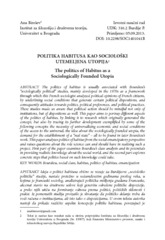Politika habitusa kao sociološki utemeljena utopija
The politics of Habitus as a Sociologically Founded Utopia
Чланак у часопису (Објављена верзија)
Метаподаци
Приказ свих података о документуАпстракт
The politics of habitus is usually associated with Bourdieu’s “sociologically political” studies, mainly developed in the 1970s as a framework through which this French sociologist analyzed political opinions of French citizens, by underlining social conditions that generate certain political dispositions, and consequently attitudes towards politics, political preferences, and political practices. These studies made us aware that political action should be mindful not only of institutions, but of dispositions as well. This paper aims to portray ifferent aspects of the politics of habitus, by linking it to research which originally generated the concept, but also by tracing its further development exemplified by some of the following oncepts: the necessity of niversalizing economic and social conditions of the access to the niversal, the idea about the sociologically founded utopia, the demand for the establishment of a “real state” – all to be found in later Bourdieu’s work. This paper... analyzes politics of habitus from the social emancipatory perspective and raises questions about the role science can and should have in realising such a project. First part of the paper examines Bourdieu’s class analysis and its potentials in providing realistic knowledge about the social world, and the second part explores concrete steps that politics based on such knowledge could take.
Кључне речи:
Burdije, Pjer / društvena klasa / social classИзвор:
Sociologija. Časopis za sociologiju, socijalnu psihologiju i socijalnu antropologiju, 2014, 41-59Финансирање / пројекти:
- Истраживање климатских промена и њиховог утицаја на животну средину - праћење утицаја, адаптација и ублажавање (RS-MESTD-Integrated and Interdisciplinary Research (IIR or III)-43007)
Колекције
Институција/група
IFDTTY - JOUR AU - Birešev, Ana PY - 2014 UR - http://rifdt.instifdt.bg.ac.rs/123456789/707 AB - The politics of habitus is usually associated with Bourdieu’s “sociologically political” studies, mainly developed in the 1970s as a framework through which this French sociologist analyzed political opinions of French citizens, by underlining social conditions that generate certain political dispositions, and consequently attitudes towards politics, political preferences, and political practices. These studies made us aware that political action should be mindful not only of institutions, but of dispositions as well. This paper aims to portray ifferent aspects of the politics of habitus, by linking it to research which originally generated the concept, but also by tracing its further development exemplified by some of the following oncepts: the necessity of niversalizing economic and social conditions of the access to the niversal, the idea about the sociologically founded utopia, the demand for the establishment of a “real state” – all to be found in later Bourdieu’s work. This paper analyzes politics of habitus from the social emancipatory perspective and raises questions about the role science can and should have in realising such a project. First part of the paper examines Bourdieu’s class analysis and its potentials in providing realistic knowledge about the social world, and the second part explores concrete steps that politics based on such knowledge could take. T2 - Sociologija. Časopis za sociologiju, socijalnu psihologiju i socijalnu antropologiju T1 - Politika habitusa kao sociološki utemeljena utopija T1 - The politics of Habitus as a Sociologically Founded Utopia SP - 41 EP - 59 DO - 10.2298/SOC1401041B ER -
@article{
author = "Birešev, Ana",
year = "2014",
abstract = "The politics of habitus is usually associated with Bourdieu’s “sociologically political” studies, mainly developed in the 1970s as a framework through which this French sociologist analyzed political opinions of French citizens, by underlining social conditions that generate certain political dispositions, and consequently attitudes towards politics, political preferences, and political practices. These studies made us aware that political action should be mindful not only of institutions, but of dispositions as well. This paper aims to portray ifferent aspects of the politics of habitus, by linking it to research which originally generated the concept, but also by tracing its further development exemplified by some of the following oncepts: the necessity of niversalizing economic and social conditions of the access to the niversal, the idea about the sociologically founded utopia, the demand for the establishment of a “real state” – all to be found in later Bourdieu’s work. This paper analyzes politics of habitus from the social emancipatory perspective and raises questions about the role science can and should have in realising such a project. First part of the paper examines Bourdieu’s class analysis and its potentials in providing realistic knowledge about the social world, and the second part explores concrete steps that politics based on such knowledge could take.",
journal = "Sociologija. Časopis za sociologiju, socijalnu psihologiju i socijalnu antropologiju",
title = "Politika habitusa kao sociološki utemeljena utopija, The politics of Habitus as a Sociologically Founded Utopia",
pages = "41-59",
doi = "10.2298/SOC1401041B"
}
Birešev, A.. (2014). Politika habitusa kao sociološki utemeljena utopija. in Sociologija. Časopis za sociologiju, socijalnu psihologiju i socijalnu antropologiju, 41-59. https://doi.org/10.2298/SOC1401041B
Birešev A. Politika habitusa kao sociološki utemeljena utopija. in Sociologija. Časopis za sociologiju, socijalnu psihologiju i socijalnu antropologiju. 2014;:41-59. doi:10.2298/SOC1401041B .
Birešev, Ana, "Politika habitusa kao sociološki utemeljena utopija" in Sociologija. Časopis za sociologiju, socijalnu psihologiju i socijalnu antropologiju (2014):41-59, https://doi.org/10.2298/SOC1401041B . .


